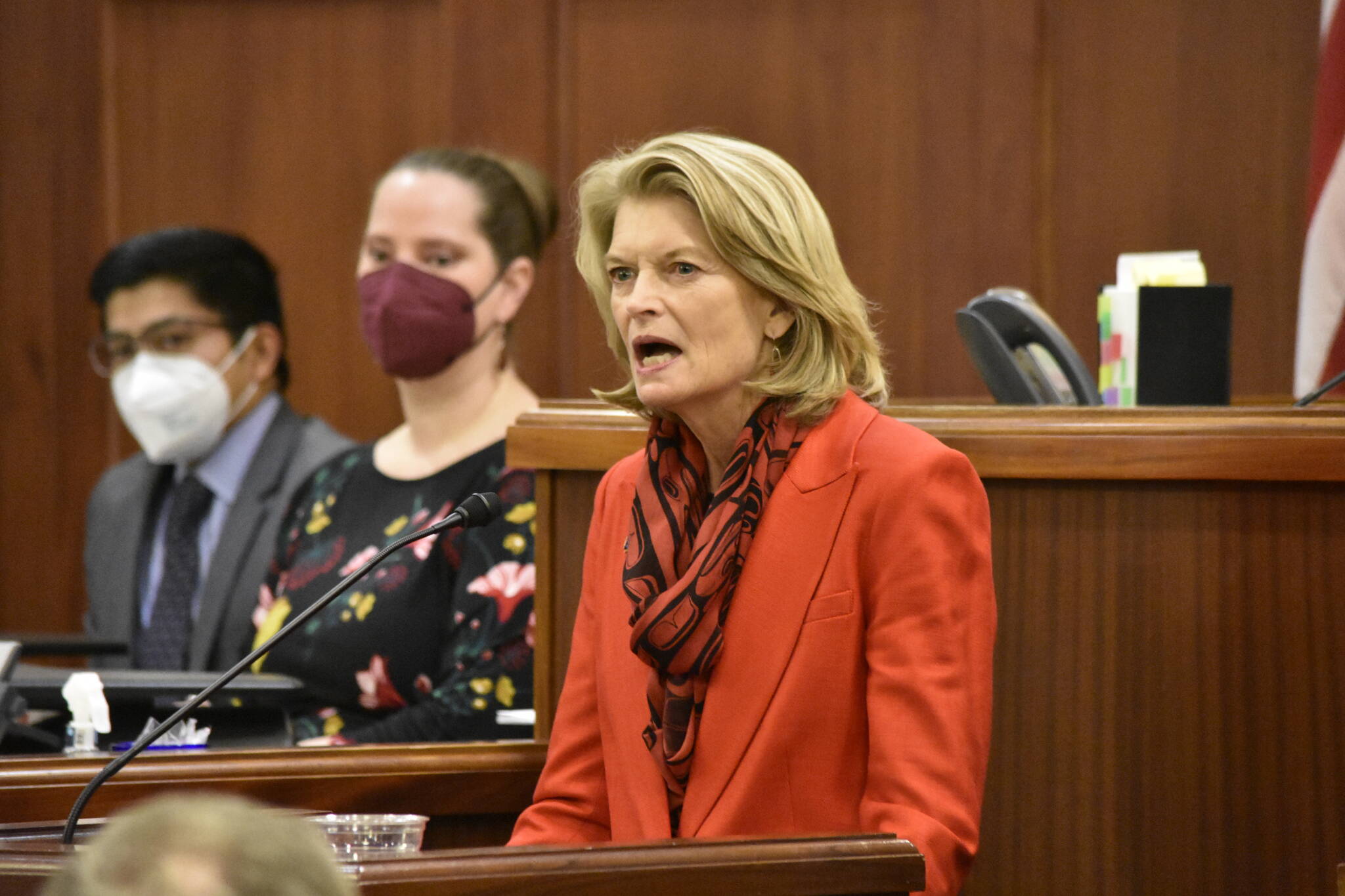U.S. Sen. Lisa Murkowski, R-Alaska, was one of 14 Republican Senators to vote for the Bipartisan Safer Communities Act, a federal bill aimed at addressing the high levels of gun violence in the United States.
The bill hasn’t officially passed the Senate yet, but enough Senators have expressed support for the legislation needed to pass the 60-vote threshold to overcome a filibuster.
Speaking with reporters from Washington, D.C., Murkowski said the bill focused on mental health issues and did nothing to infringe on the Second Amendment rights of law-abiding gun owners.
“The American public deserves to see some response,” Murkowski said, in reference to the high rate of mass-shooting events in the U.S. Recent high profile events include a shooting in Uvalde, Texas, where a gunman killed 19 children and 2 adults at an elementary school and Buffalo, New York, where a gunman killed 10 mostly African American people at a grocery store.
The senator called the legislation, “a thoughtful and targeted approach to the specific problems that have led to several of these mass shootings,” and emphasized the bill’s targeting of mental health issues rather than restrictions on firearms.
[Faculty union rallies for renewed negotiations]
According to Murkowski, one of the bill’s provisions extends background checks for gun purchasers under 21 to include any juvenile criminal record. A potential buyer between 18-21 with a juvenile conviction for crimes disqualifying an adult from purchasing a gun will no longer be able to purchase a firearm, Murkowski said.
The bill also provided provisions to close what Murkowski called the “boyfriend loophole,” to address domestic abusers with no legal relationship to their victim.
The bill also provides funding for the expansion of mental health services, an aspect of the bill Murkowski called “historic.”
“Access to mental health services is really emphasized in this measure,” Murkowski said. “It invests in telehealth and mental health, early identification and intervention.”
The bill will provide an additional $2.5 billion nationwide for the Stop School Violence grants from the U.S. Department of Justice, Murkowski said.
But while the bill received unprecedented bipartisan support, including from Senate Majority Leader Mitch McConnell, R-Kentucky, and Sen. John Cornyn, R-Texas, 34 Republican senators including Alaska’s Sen. Dan Sullivan voted against the bill.
Sullivan’s office did not immediately respond to request for comment.
The legislation was also opposed by the National Rifle Association, which said the bill fell short of actually preventing gun violence.
“The NRA will support legislation that improves school security, promotes mental health services, and helps reduce violent crime,” the group said in a statement. “However, we will oppose this gun control legislation because it falls short at every level. It does little to truly address violent crime while opening the door to unnecessary burdens on the exercise of Second Amendment freedom by law-abiding gun owners.”
But Murkowski, who read the statement during the news conference, said the bill did in fact promote mental health services and improve school security.
“It may not be 100% but it’s a heck of a lot more than we have now,” Murkowski said. “The NRA has taken a very, very, very hard view of anything they view as a slight, slight erosion of Second Amendment rights.”
Murkowski, who is facing a Republican challenger for her senate seat, said the legislation was too important for her to consider election-year politics.
“I don’t have the opportunity or the ability to move complex and sometimes contentious votes just because I happen to be in an election cycle,” Murkowski said. “I can’t look at a matter like this as significant as it is and say ‘I’ve got to test the winds here.’ This needs to be a vote that I will stand by regardless of whether I am at the beginning of a six-year term or the end.”
But Kelly Tshibaka, a former Alaska Department of Administration Commissioner who’s received the endorsement of former President Donald Trump in her bid to unseat Murkowski, accused the senator of undermining Alaskans’ Second Amendment rights.
“She just demonstrated why no one trusts her on important issues – she voted to undermine the 2nd Amendment but wants people to believe she didn’t,” Tshibaka said in a statement. “In Alaska, the lawful ownership of firearms is part of who we are, but Murkowski is too intent on impressing her elite D.C. friends that she’s forgotten all about us. When I’m the next senator from Alaska, I will always fight for our constitutional rights, I will always stand up for the (Second) Amendment, and I would have voted against this gun control bill.”
Tshibaka was critical of the inclusion of funding for so-called red-flag laws, which make it easier for law enforcement officials to take guns from people judged to be dangerous.
During the news conference, Murkowski said the bill doesn’t establish federal red flag laws, nor does it incentivize states to enact such laws, or penalize states that don’t. According to the Associated Press, the bill provides funding for states to implement or support red flag laws.
Murkowski said Thursday there were some amendments that may be added to the bill, but she expected the Senate to hold a vote on the bill Friday.
• Contact reporter Peter Segall at psegall@juneauempire.com. Follow him on Twitter at @SegallJnuEmpire.

